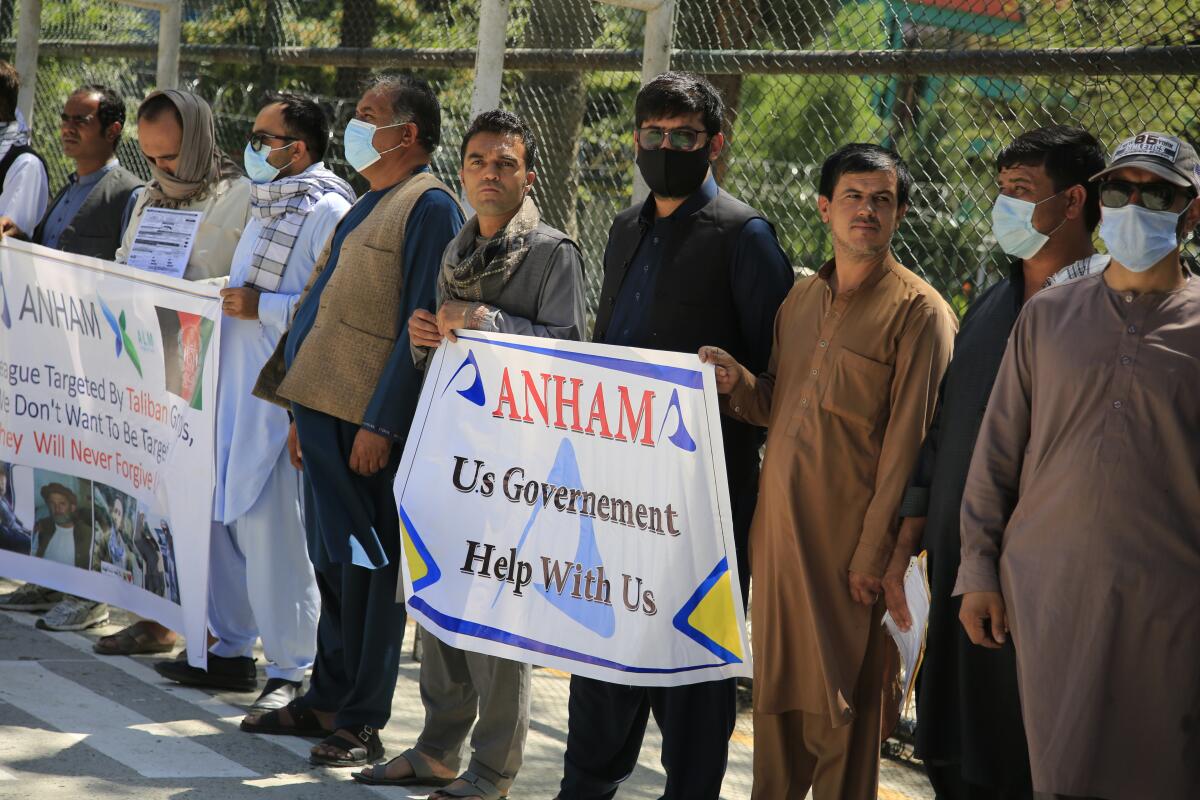‘They deserve our help.’ U.S. expands Afghan refugee program as violence spikes

- Share via
WASHINGTON — As violence in Afghanistan soars, the Biden administration announced Monday that it was expanding the pool of endangered Afghans who can receive refugee visas, but the system’s complexities may limit who can benefit.
The new visa program comes after demands from Congress, news organizations and human rights groups for greater protection for tens of thousands of Afghans who worked with U.S. entities during the two-decade war and now face potential retaliation from Taliban forces advancing swiftly as U.S. and NATO troops withdraw.
“There are Afghans who helped us, and they deserve our help,” Secretary of State Antony J. Blinken said in detailing the effort. “We will do all we can to invest and ... continue to welcome Afghan immigrants and refugees as our neighbors in gratitude for helping us despite the danger. We won’t forget.”
Among the newly eligible are Afghans who worked for U.S. nongovernmental organizations, aid programs and media. Administration officials said they could not estimate how many people will qualify but that it could be tens of thousands.
Already, some 20,000 Afghans who worked as translators for the U.S. military and diplomatic missions are being considered for special immigrant visas or have expressed interest in acquiring them. A first group of about 200 visa recipients arrived at an Army base in Virginia last week and another 4,000 or so, including family members, are expected in the coming weeks, Blinken said.
Yet many thousands more Afghans say their lives are at risk as Taliban extremists take control of more territory.
As the U.S. hastens to exit Afghanistan by Aug. 31, women fear a potential return to power by the Taliban and its harsh view of their role in society.
The expanded program requires the individuals and families to get themselves out of Afghanistan before their cases can be processed — a potential deal-killer for many. The program does not envision any resettlement support for the applicants.
Blinken acknowledged the dilemma, which some critics say renders the offer nearly meaningless.
“It is incredibly hard, hard on so many levels,” Blinken said, adding that many Afghans, especially women and girls and people who worked with Americans, “feel an acute sense of threat and fear.”
“People have to do very difficult things to make sure they can find safety and security,” he said. “We will do everything we can to help them, including making [available] these different avenues of arrival to the United States.”
Blinken said financial assistance would also be given to third countries that receive fleeing Afghans, but he did not provide details.
Human Rights First, based in Washington, welcomed the expanded visa eligibility but said the lengthy process and lack of evacuation plans will leave thousands of potential applicants in grave danger in the face of the Taliban onslaught.
“Efforts for evacuation need to be operationalized immediately, resources across agencies need to be increased and the evacuation of these allies must take place as quickly as possible,” the organization’s senior director for government affairs, Jennifer Quigley, said in a statement.
A senior administration official, who briefed reporters on condition of anonymity in keeping with government protocols, also acknowledged that the travel requirement will be difficult for many to meet. The visa process starts only when the applicants’ employers refer them to the program; then the applicants must go to a third country. Approval can take 12 to 14 months, the official said.
The program is a “unique form of protection to those who are particularly vulnerable as a result of their affiliation with the United States,” the official said.
In a separate statement, the State Department outlined the program for the visas, known as Priority 2 within the U.S. Refugee Admissions Program.
“The U.S. objective remains a peaceful, secure Afghanistan,” it said. “However, in light of increased levels of Taliban violence, the U.S. government is working to provide certain Afghans, including those who worked with the United States, the opportunity for refugee resettlement to the United States.”
The Taliban and the U.S.-backed Afghan government have been engaged in talks aimed at achieving a political settlement to the long conflict, but those efforts have largely stalemated as the Taliban presses ahead with its military advance. The U.S. withdrawal is expected to be complete this month.
Also Monday in Kabul, Afghan President Ashraf Ghani bitterly blamed the speedy U.S. withdrawal for mounting violence.
“An imported, hasty [peace process] not only failed to bring peace but created doubt and ambiguity” among Afghans, Ghani said in a speech before parliament, according to the Associated Press.
In Washington, State Department spokesman Ned Price countered that there was “only one group” — the Taliban — responsible for what he called atrocious acts that are steadily worsening.
The administration says it is banking on a Taliban that will eventually adhere to international standards if it comes to govern all or part of the country, as a way to avoid being labeled a pariah state. The Taliban, however, has historically shown little interest in currying favorable global public opinion.
More to Read
Get the L.A. Times Politics newsletter
Deeply reported insights into legislation, politics and policy from Sacramento, Washington and beyond. In your inbox twice per week.
You may occasionally receive promotional content from the Los Angeles Times.












